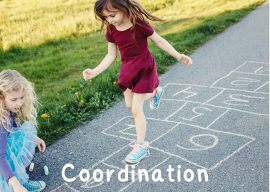Treatment and Therapy for Coordination Disorders

Coordination disorders often result from malfunction of the cerebellum which coordinates sequences of movement, balance and posture. A variety of things can cause coordination issues. Symptoms of coordination may include difficulty walking, completing bimanual tasks like buttoning, zipping and cutting, sports, catching, or jumping jacks.
Coordination disorders can cause other abnormalities, such as ataxia, tremors, dysarthria, and nystagmus.
Facts about Coordination Disorders
- Prevalence: DCD is relatively common, with estimates suggesting that it affects around 5-6% of school-aged children. It is more prevalent in boys than in girls.
- Motor Skill Challenges: Children with coordination issues may struggle with various motor skills, including running, jumping, catching, throwing, handwriting, and other tasks that require coordination and precision.
- Academic Impact: Coordination difficulties can affect a child’s performance in school. Tasks such as writing, using scissors, and participating in physical education activities may be particularly challenging.
- Social and Emotional Impact: Children with coordination issues may experience frustration, embarrassment, or low self-esteem due to their struggles in physical and social activities. Support and encouragement are crucial for their emotional well-being.
- Causes and Risk Factors: The exact cause of coordination issues is not always clear. Both genetic and environmental factors may contribute. Premature birth, low birth weight, and a family history of coordination difficulties may increase the risk.
- Intervention and Therapy: Early intervention is key to addressing coordination issues. Occupational therapy and physical therapy are often recommended to help children improve their motor skills and develop compensatory strategies.
- Multidisciplinary Approach: Treatment plans for coordination issues often involve a multidisciplinary team, including occupational therapists, physical therapists, educators, and parents. Collaboration is essential to address the various aspects of a child’s development.
- Lifelong Impact: While many children with coordination issues can make significant progress with appropriate intervention, some may continue to experience challenges into adulthood. However, with support and accommodations, individuals with DCD can lead successful and fulfilling lives.
How Polka Dot Kids Help
We take a comprehensive examination to determine the factors affecting coordination then utilize reflex integration and neuro to reprogram the body while teaching the families how to break down tasks into smaller segmented movements.